5 min read
Share this post

Our M2.1 -Requests-Would-Could-Can-May-Might lesson, filed under our Verbs-Modals category is designed for teaching polite requests to your ESL students.
In English, we use can to express informal requests (Can I borrow your book?) and could for more formal requests (Could I borrow your book?). Our lesson begins by outlining this distinction:
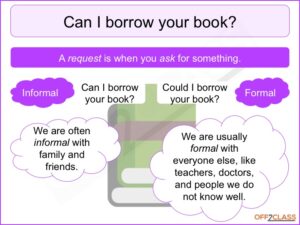
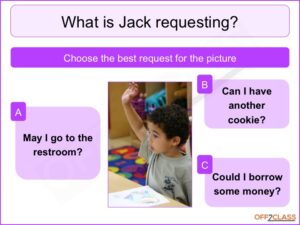
Teaching polite requests with I as the subject
After introducing the basic distinction between informal and formal requests we introduce the 4 modals used to express polite requests with I. Can I for informal requests, Could I for more formal requests, May I for even more formal requests and Might I for very formal requests. We then explore the 3 modals that we use when requesting permission Can I / Could I / May I (May I go to the washroom?). To practice these different modals we use a number of situational examples and have the student pick which modal + verb construction is the most appropriate for each situation:
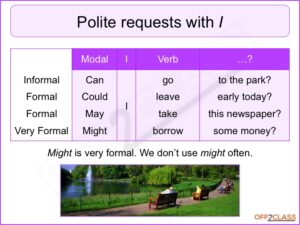
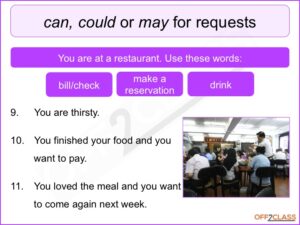
Teaching polite requests with you as the subject
We now introduce the 4 modals used to express polite requests with you as the subject. Can you for informal requests, Could you for more formal requests, Would you for even more formal requests and Will you for very formal requests. We then move on to explore polite requests using the construction of Would you mind. We use this construction when asking for permission (Would you mind if I opened the window?) and when asking for someone to do something (Would you mind opening the window?). Note that we use the past simple in the Would you mind… asking for permission construction and verb-ing in the Would you mind… when asking someone to do something construction:
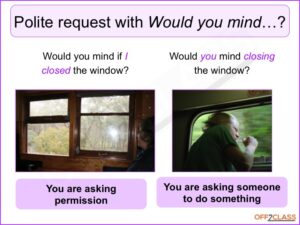
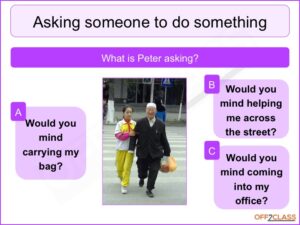
Share this post



14 Comments
Great resource!! Thanks for sharing and helping other teachers!!
Hi Ana! Thanks for stopping by, we hope you enjoy! would/could/can/may/might for requests can be so challenging for ESL learners!
wonderful and helpful resources! millions of “thank you”
Thank you so much for the resource. I haven’t taught request with my A2 business group and B1. I have planned to teach “Requests” tomorrow and this is the perfect touch to my lesson with your great an easy to follow picture explanations.
Thank you off to class 🙂
Fantastic Larrisa! Out of curiosity, what kind of environment are you teaching in?
very useful
Glad you enjoyed Amsha!
Great resources!!! Thank you so much for sharing this lesson…and it’s easy to understand
You’re welcome!
Great lesson, thank you Chris.
Thanks for stopping by Nick!
Thanks and appreciated
Hi, does someone knows the answers for this question, What difference would there be between an informal polite request and a formal polite request?
Hi Lily,
That’s actually a great question to pose in the Off2Class Facebook group to see what other teachers say: http://www.facebook.com/groups/off2class/. We have lots of discussions about English grammar in there!
Happy teaching,
Sarah